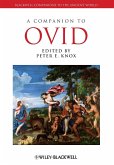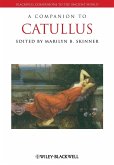The first general introduction to Ovid written in English in over 20 years, this book provides a unique and accessible introduction to the complete works of Ovid. Using a thematic approach, Volk lays out what we know about Ovid s life, presents the author s works within their poetic genres, and discusses central Ovidian themes.
This book provides a unique and accessible introduction to thecomplete works of Ovid. Using a thematic approach, Volk lays outwhat we know about Ovid s life, presents the author s works withintheir poetic genres, and discusses central Ovidian themes.
The first general introduction to Ovid written in English inover 20 years, offering the very latest Ovidian scholarship
Discusses the complete works of Ovid
Accessible writing and a thematic approach make this text idealfor a broad audience
A current revival in Ovid makes this timely edition highlyvaluable
Hinweis: Dieser Artikel kann nur an eine deutsche Lieferadresse ausgeliefert werden.
This book provides a unique and accessible introduction to thecomplete works of Ovid. Using a thematic approach, Volk lays outwhat we know about Ovid s life, presents the author s works withintheir poetic genres, and discusses central Ovidian themes.
The first general introduction to Ovid written in English inover 20 years, offering the very latest Ovidian scholarship
Discusses the complete works of Ovid
Accessible writing and a thematic approach make this text idealfor a broad audience
A current revival in Ovid makes this timely edition highlyvaluable
Hinweis: Dieser Artikel kann nur an eine deutsche Lieferadresse ausgeliefert werden.
"Katharina Volk's splendid new introduction to the poetry of Ovid is at once innovative, expert and highly accessible, bringing triumphantly to life the most entertaining poet of the Romans." -- Stephen Harrison, University of Oxford
"Volk's vivid and concise analysis is a tour de force, doing full justice to Ovid's extraordinary artistry and matching the rainbow diversity of his many genres" -- Elaine Fantham, Princeton University
"Volk's vivid and concise analysis is a tour de force, doing full justice to Ovid's extraordinary artistry and matching the rainbow diversity of his many genres" -- Elaine Fantham, Princeton University
"The past few years have seen several new translations of [Ovid's] work appear and a few acute scholarly studies, too. Among the more accessible of the latter category is Katharina Volk's introduction to Ovid...Volk, a professor of classics at Columbia and the new editor of The Transactions of the American Philological Association,is about as high a star in the American academic firmament as one might find. Her tone is devoid of the jargon and pretense by which many an Ovidian monograph is marred. After concise initial chapters on the poet's work and life, we find sensible discussions on elegy, women, and Rome, as well as a selective survey of Ovid's subsequent reception in Western art and literature." (Sewanee Review, 2012)
" ...the book is truly first-class. It will, I believe, become invaluable for any course in which Ovid is a central component..." (BMCR, 6 February 2012)
"Katharina Volk's Ovid is a wonderfully deft and spirited introduction to the whole of the poet's oeuvre, covering a remarkable amount of ground in just under 150 pages ." (Times Literary Supplement, 16 September 2011)
"That quibble aside, this is an admirable book, suitable as both an up-to-date introduction for tyros and as a refreshing overview of matters Ovidian for advanced scholars." (Acta Classica,1 December 2011)
" ...the book is truly first-class. It will, I believe, become invaluable for any course in which Ovid is a central component..." (BMCR, 6 February 2012)
"Katharina Volk's Ovid is a wonderfully deft and spirited introduction to the whole of the poet's oeuvre, covering a remarkable amount of ground in just under 150 pages ." (Times Literary Supplement, 16 September 2011)
"That quibble aside, this is an admirable book, suitable as both an up-to-date introduction for tyros and as a refreshing overview of matters Ovidian for advanced scholars." (Acta Classica,1 December 2011)








